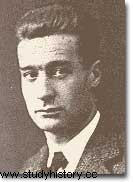
André Zirnheld (March 7, 1913 - July 27, 1942) was a paratrooper French, member of the Special Air Service during the Second World War. He is famous for having been the first French paratrooper officer killed in action, and as the author of the poem La prie du para.
André Zirnheld was born in Paris on March 7, 1913. He graduated with a degree in philosophy and was appointed professor of philosophy at the Carnot high school in Tunis in 1937. In October 1938 he was assigned as a professor at the College of the French Secular Mission in Tartus, Tunisia.
War
At the outbreak of the Second World War, André Zirnheld was assigned to an anti-aircraft battery in Lebanon. Zirnheld is voluntary to go and fight in mainland France but the armistice of June 22, 1940 is signed before. Zirnheld then joined Free France passing through British Palestine. He was condemned for desertion by a French military tribunal, which confiscated all his property.
Zirnheld was assigned as a private to the 1st Marine Infantry Battalion, with which he took part in the first combat of an FFL unit in Sidi-Barani on September 6, 1940. In January 1941, because of his diplomas, Zirnheld was withdrawn from the front and appointed deputy director of the information and propaganda service in Cairo. Although he took a great interest in his work, Zirnheld quickly asked to be sent to the front. He enrolled in the cadet officer course at the Ecole des Aspirants in Brazzaville in June 1941, from which he graduated fifth at the end of 1941.
The SAS
Back in the Middle East in February 1942, Zirnheld volunteered for the 1st parachute company, integrated as a French squadron in the Special Air Service.
On his first mission, Zirnheld commanded a four-man team that raided Berka-3 airport on June 12, 1942, destroying six enemy planes on the ground. He then receives, like all SAS after his first mission, the insignia of the SAS operational wings or "Egyptian wings". His next missions will be the sabotage of a railway line, then a vehicle attack and bring back Luftwaffe prisoners. It is then proposed for the Croix de guerre and the Military Cross.
The last mission
Zirnheld's fourth mission is a raid on the large Sidi-Haneish airport. This raid was carried out on the night of July 26 to 27, 1942 by eighteen armed jeeps led by British and French SAS. Within minutes, the jeeps, in an inverted V formation, were traveling the length of the runway strafing the parked planes. Thirty-seven bombers and transport planes are destroyed, for the loss of two British SAS killed on the airport.
On the way back, Zirnheld's jeep has a flat tire. One of the other jeeps, aboard which is the midshipman François Martin, comes to his aid, while the rest of the formation abandons them. The two jeeps repaired, hit the road again, then punctured a second time. When the sun rises, the jeeps stop and try to camouflage themselves. Three hours later, a formation of four German Junkers Ju 87 “Stuka” bombers spotted them and machine-gunned them. On their second pass, Zirnheld is hit, first in the shoulder, then in the abdomen. He died around 1 p.m.
Shortly before his death, he said to François Martin “I am going to leave you. Everything is in order in me. », and asks him to take care of the papers and books in his gear. It was Martin who discovered Zirnheld's notebook in which he wrote The Para's Prayer.
Zirnheld will be cited in the order of the Liberation, with the comment:"Excellent leader, calm and daring. ". An attitude that perfectly suits the SAS motto, Who dares wins.
He will be made a Companion of the Liberation on May 1, 1943 posthumously.
The Para's Prayer
The para prayer is well known. It was adopted by the French parachute troops. Many soldiers say “prayer” sparked or strengthened their vocation. On the other hand, its author is much less known, and an article in Terre Magazine dedicated to him even called him "a forgotten hero".
Excerpt:
“I have nothing to complain about the war. From her, I must learn to live from anything. From her, I must take advantage, even greater profit than from the life I would have led without her. On the contrary, it is peace; the situation, the career which would have been artificial and dangerous for my progress. After the war, the whole problem will be to discover a similar rhythm. »
